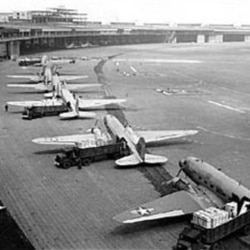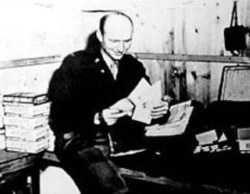STEVE EMBER: Welcome to THE MAKING OF A NATION – American history in VOA Special English. I’m Steve Ember
(MUSIC)
The Second World War ended with the surrender of Japan in August nineteen forty-five. Americans looked to their new president, Harry Truman, to lead them into a new time of peace.
Truman was vice president until President Franklin Roosevelt died suddenly in the closing months of the war.
Almost no one expected President Truman to be as strong a leader as Roosevelt had been. And, at first, they were right. Truman had one problem after another during his first months in the White House.
Truman's first big problem was the economy. Almost two million Americans lost their jobs as factories ended wartime production. Americans everywhere worried about what would happen next. Only a few years before, the nation had suffered through the worst economic crisis in its history. No one wanted to return to the closed banks, hungry children and other sad memories of the Great Depression.
In some ways, the economy did better after the war than many experts had predicted. Many Americans still had money that they saved during the war. And Congress passed a law designed to help people keep their jobs. The situation could have been much worse than it was.
However, the economy could also have been better. Much better. Almost overnight, the price of almost everything began to rise.
President Truman tried to stop the increases through a special price control agency that had been created during the war. However, thousands of business people refused to follow the government price control rules. Instead, they set their own prices for goods.
Store owners would tell government officials that they were obeying the price controls. But often they charged whatever they wanted for the goods they sold.
Businesses were not the only ones who were refusing to obey government price controls. Organized labor did the same thing.
President Truman had always been a friend of labor unions. But during the first months of his administration, he became involved in a fierce struggle with coal miners and railroad workers.
The first sign of trouble came in September nineteen forty-five. A group of auto workers closed down factories at the Ford Motor Company. Then, workers at General Motors went on strike. Soon there were strikes everywhere -- the oil industry, the clothing industry, the electrical industry and more.
The strikes made Truman angry. He believed the striking workers were threatening the economy and security of the United States. He became even angrier when union representatives came to the White House and refused to accept a compromise wage offer.
Truman ordered the Army to take over the railroads and the coal mines. Within a short time, the striking coal miners returned to work. However, the president had less success with the railroad workers. He became so angry with the unions representing them that he asked Congress to give him the power to draft all striking railroad workers into the armed forces.
The rail strike finally ended. But millions of Americans lost faith in Truman's ability to lead the country and to bring people together.
By late nineteen forty-six, most Americans believed that the man in the White House did not know what he was doing. Truman seemed weak and unable to control events.
Union members disliked him because of his strong opposition to the coal and rail strikes. Farmers opposed Truman because of the administration's effort to keep meat prices low. Conservatives did not trust the reforms that Truman promised in his speeches. And liberal Democrats watched with concern as many of Franklin Roosevelt's old advisers left the government because they could not work with Truman.
In November of nineteen forty-six, the people voted in congressional and state elections. The results showed they were not satisfied with Truman and his Democratic Party. Republicans won control of both houses of Congress for the first time in eighteen years. And Republicans were elected governor in twenty-five states.
The election was a serious defeat for the Democrats -- but a disaster for Truman. Some members of his party even called on him to resign. Few people gave Truman much chance of winning the next presidential election in nineteen forty-eight.
However, Harry Truman began to change in the months that followed the nineteen forty-six congressional elections. He became a stronger speaker. He showed more understanding of the powers of the presidency. And in matters of foreign policy, he began to act more presidential. This was especially so in Truman's reaction to Soviet aggression in Germany.
Truman wanted to rebuild Germany, as well as the other war-torn countries of Western Europe. As we heard last week, his administration worked closely with western European leaders to rescue their broken economies through the Marshall Plan.
But the Soviets did not want to see Germany rebuild, at least not so quickly. At first, they flooded Germany with extra German currency in an effort to destroy its value. They walked out of economic conferences. And, finally, in early nineteen forty-eight, they blocked all the roads to West Berlin. West Berlin was in communist East Germany, but not under communist control as was East Berlin.
After the war, the Allies had divided Germany in half. West Germany had a democratic government. East Germany was communist, under Soviet control.
The Soviet actions in Berlin were a direct threat to the west. Truman had three difficult choices. If he did nothing, the world would think the United States was weak and unable to stop Soviet aggression. If he fought the blockade with force, he might start a third world war.
But there was another choice.
The Allies proposed the idea of flying tons of food, fuel and other supplies into West Berlin. Not just once, but every day, as long as the Russians continued their blockade.
It would be a difficult job. West Berlin was home to two and a half million people. No one had ever before tried to supply so large a city by air. Planes would have to take off every three and a half minutes, day and night, to supply the people with enough food, medicine, clothing, and badly needed coal.
The operation involved American C-47 and larger C-54 transport planes, along with British Lancaster, York, and Hastings aircraft.
On June twenty-sixth, the first C-47s landed at Tempelhof Airport – the beginning of the great operation that was to come. Plans called for the operation to last just a few weeks.
The planes landed in the blockaded city and local volunteers provided support on the ground. Former mechanics of the Luftwaffe, the German air force, joined Americans in servicing the aircraft. More than twenty thousand Berliners worked day and night to build an additional landing field for the American and British planes. It became Tegel, now Berlin’s major airport. As part of the supply effort, the British Royal Air Force even landed Sunderland Flying Boats on a Berlin lake.
Brigadier General Joseph Smith was appointed task force commander of the American part of the airlift. General Smith called the mission “Operation Vittles,” using an American slang term for food.
“Operation Vittles” also led to “Operation Little Vittles” for the dropping of chocolates and other treats to children. The pilots who did this became known as “Candy Bombers.” Appreciative German children called them “Die Schokoladen Flieger” – the chocolate pilots.
GAIL HALVORSEN: “They wanted to know which airplane I was in. I said, ‘you can tell my airplane – I’ll wiggle the wings and you’ll know it’s me – Watch just that airplane.’ They said ‘That’s good. Wunderbar [wonderful].’
“I came back the next day and I put little parachutes for the Kaugummi [chewing gum] and the Schokoladen [chocolates], so they could see it and so it wouldn’t hit them hard in the head, slow it down. And so I wiggled the wings and they waved their hands, and I pushed it out of the airplane. And that’s how it started.”
(Sound courtesy of Ralf Gruender)
It was the idea of Gail Halvorsen, a pilot in the United States Air Force. Lieutenant Halvorsen became known as “Mister Wiggly Wings.” From his plane, he would drop chewing gum and chocolates attached to tiny parachutes made from handkerchiefs.
Soon, many of the Airlift pilots were dropping candy from their planes, including into Soviet-controlled areas that they flew over. Americans back home supplied the handkerchiefs and the US chocolate industry supplied the treats.
Years later, in Berlin, Gail Halvorsen told German interviewer Ralf Gruender how he got the idea.
GAIL HALVORSEN: “I dropped chocolate because of gratitude. I met thirty children at the fence at Tempelhof, and not one put out their hand and said give me more than flour, give me more than coal, give me chocolate. They had no chocolate. They had no gum. But they would not be a beggar. They were so grateful for flour and I said wow, they were thankful. And when people are thankful, good things happen.”
It soon became clear to the Soviets that the Berlin Airlift would succeed. In May of nineteen forty-nine, almost one year after they had started their blockade, they ended it.
The crisis in Berlin changed the way many Americans saw their president. Harry Truman no longer seemed so weak or unsure of himself. Instead, he was acting as a leader who could take an active part in world affairs.
Truman's popularity increased. However, most Americans did not expect him to win the election in nineteen forty-eight. Almost everyone believed that the Republican candidate, New York Governor Thomas Dewey, would capture the office.
The election campaign that year turned out to be one of the most exciting and surprising in the history of the nation. That will be our story next week.
You can find our series online with transcripts, MP3s, podcasts and pictures at voaspecialenglish.com. And you can follow us on Facebook and Twitter at VOA Learning English. I’m Steve Ember, inviting you to join us again next week for THE MAKING OF A NATION -- American history in VOA Special English.
___
Contributing: David Jarmul
This was program #201. For earlier programs, type "Making of a Nation" in quotation marks in the search box at the top of the page.





